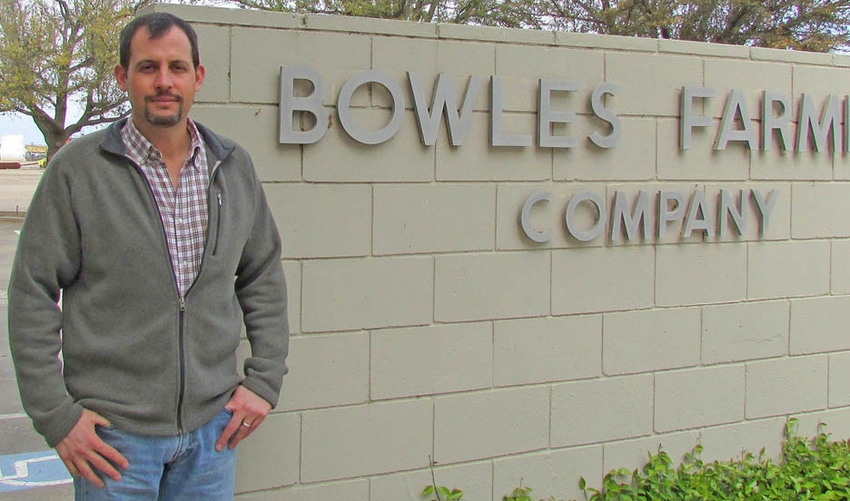April 18, 2014

The new president of Bowles Farming Company carries the weight of overseeing an 11,000-acre farm during California’s water crisis, increasingly onerous regulations and environmental restraints, plus realizing he is the sixth generation to lead the Los Banos-area farm.
Cannon Michael took the farm’s helm Jan. 1.
He never studied agriculture in college as he graduated from the University of California, Berkeley with an English degree. Michael understands the business aspects and relies on his team of farm managers to run the agronomic side of the business.
Despite ties to the historical heyday of Miller & Lux, who purchased huge swaths of land to support cattle ranching during their transformational imprint on the western U.S., Michael had a lot to learn when he hitched his future to the enterprise in 1998 after working in business for five years in Atlanta, Ga.
Over the past 15 years, he has worked a variety of jobs and shadowed his uncle, Phillip Bowles, to gain a solid understanding of the nuances and challenges that he could face if chosen to carry on the family legacy.
�
“It was never a given that the job was mine, but as the oldest male child and with my older sister not interested in taking over, I was given the opportunity to earn the position,” Michael said.
The family has a long history in California. Michael’s great-great-great-grandfather was Henry Miller, a penniless German immigrant, whose partnership with Charles Lux built up landholdings to a million-plus acres.
Miller was focused on building a cattle ranching dynasty. Due to his personality, he did not see a need to develop a succession plan near the end of his life, according to Michael. By that time, most family members, who were enjoying the wealth and lavish lifestyle the city had to offer, were not inclined to take over.
The intervening years were disrupted by the San Francisco earthquake which destroyed the partners’ city feedlots, Miller’s death in 1916, developing new leadership to guide the landholdings, and the eventual breakup of the Miller-Lux property in the 1960s. This reduced the Miller side of the ranch to the current size.
While the operation started as land to raise cattle, it is now wholly dedicated to growing cotton, fresh market and processing tomatoes, field crops, and other commodities. Michael says future economic opportunities may include solar, aquaculture, and new crops.
Stewardship of the land
Cotton farming continues to be a high priority, albeit a decision to drill down their high of 5,000 cotton acres four years ago to gain higher returns on processing tomatoes. This year, the family will plant 2,000-3,000 acres of Hazera, Acala, or Pima varieties - depending on market and weather conditions at planting.
“We would like to plant more cotton this year,” Michael said. “Cotton prices are actually high right now (early April) and our yields and quality have been excellent. The lack of water is holding us back.”
The desire to plant more cotton is partly due to a decision made several years ago to purchase three of the newest generation GPS-guided John Deere harvesters which roll and store cotton at the back of the picker and drop it at the end of the row.
This reduces field passes, fuel costs, and the number of workers and concerns for their safety. These savings, Michael says, are slightly offset by the higher cost of the wrapping material.
The farm has also incorporated reduced tillage practices. At one time, Michael says it took up to seven passes to prepare fields to plant cotton and other crops. Today it requires two trips through the fields.
The company’s commitment to its employees and the stewardship of the land is evident. They recognize their team’s hard work by providing health care, a defined benefits pension plan, and profit sharing.
Environmentally, the family continues to evaluate and incorporate the latest equipment, technology, monitoring, and research innovations to protect and preserve the farm’s investment.
Buried drip was incorporated on 60-inch tomato beds which can be split when rotating to cotton. The collaboration with researchers to screen new products and ideas is important to the farming operation.
New regulations limiting chemistries to protect crops from insect and weed pressures are a concern, Michael says. Besides spider mites, there is low lygus pressure and no whitefly. Some Race 4 fusarium has been found but is not widespread.
“We use integrated pest management to determine spray thresholds and we try to use good levels of beneficial insects and softer chemistries,” he said.
No lack of ostacles
The farm has moved away from harsher organophosphates to defoliate cotton.
Since Cannon does not play a large role in the daily agronomic operations, he engages in discussions and attends events on the issues facing California agriculture.
Water is the top concern in California agriculture today, he believes. However, with the environmental and regulatory atmosphere, which the federal government and state legislature impose, there is no lack of other obstacles hindering California agriculture.
To address these concerns, Michael is generous with his time. He serves on association boards of directors, speaks at water rallies, and helps offer ideas to advance agriculture’s success.
His many extra activities include director and trustee of the Henry Miller Reclamation District and the San Luis Resource Conservation District president.
Michael is a director for the California Cotton Alliance, California Tomato Research Institute, Cotton Council International, and the San Luis Canal Company.
He is the immediate past president of the California Cotton Ginners and Growers Association.
While it sounds like a plateful, Michael enjoys time with his wife Heidi and three boys - Nick, Luke and Drake. Michael shares with his sons that a position with the Bowles operation is not guaranteed - it must be earned.
Michael embraces social media to share his thoughts on agricultural issues. His Twitter handle is @agleader.
You May Also Like




